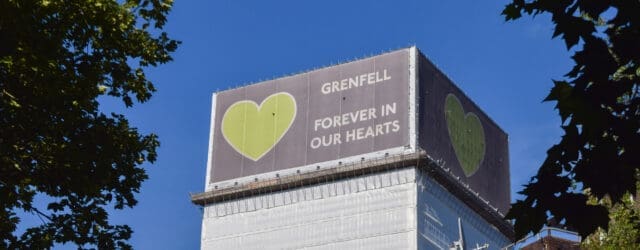Procurement After Grenfell: Excluding bidders for misconduct
June 2025The tragedy at Grenfell Tower was not only a human catastrophe but a systemic failure of regulatory oversight, construction standards, and public procurement processes. While much has been written about the fire safety breaches involved, one lesson remains insufficiently explored: how procurement failures contributed to the conditions that allowed such a disaster to occur.
This article revisits these procurement failures in light of recent developments in UK procurement law, including the introduction of the Procurement Act 2023 and recent litigation: particularly Siderise Insulation Ltd v Royal Borough of Kensington and Chelsea (RBKC), a High Court case examining exclusion of suppliers following the Grenfell Inquiry’s Phase 2 findings.
We ask below whether, in the wake of Grenfell, the new procurement regime does enough to prevent similar failures and whether contracting authorities are equipped to exclude dangerous suppliers without falling foul of due process or legal uncertainty.
The Siderise Case: Exclusion Based on the Grenfell Inquiry
In Siderise Insulation Ltd v RBKC, the High Court considered a challenge by Siderise to its exclusion from future construction and maintenance projects by the Royal Borough of Kensington and Chelsea. Being the very Borough where Grenfell Tower stood, the Council was no doubt keen to show it was taking a tough stance to prevent any recurrence of any similar tragedy.
The Authority’s Decision
Following the release of the Grenfell Inquiry’s Phase 2 report, the Borough adopted a policy excluding suppliers who had acted dishonestly, misleadingly, or with incompetence, where such conduct contributed to the Grenfell fire or its spread.
RBKC adopted restrictions on the use of contractors and products criticised in the Grenfell Tower Inquiry. In particular:
- Applying exclusions under Regulation 57(8)(c) of the Public Contracts Regulations 2015 (“PCRs”) on the grounds of professional misconduct.
- These exclusions targeted Arconic Architectural Products, Kingspan Insulation Ltd, and Saint-Gobain Construction Products UK Ltd (Celotex).
- The exclusions applied across all procurements, not just construction, and will last for five years.
- The Council has requested that these suppliers be replaced in frameworks (e.g., LHC), which is quite a bold move.
Siderise was excluded on the basis that its marketing of cavity barriers was allegedly misleading. The Inquiry had found no evidence that Siderise’s products contributed to the fire. The Borough argued that the marketing alone justified exclusion.
While the Borough does not buy construction products (such as Siderise’s) directly, it does so indirectly through its appointed contractors. Its decision concluded there was “greater freedom for it to direct through instructions and contract terms any particular requirements relevant to the subject-matter of the contract e.g. what sub-contractors can be used.” This was controversial as it effectively sidestepped the provisions on exclusion set out in exhaustive terms under Regulation 57 of the PCRs.
Judicial Review
Siderise sought permission for judicial review on two grounds:
- Ground 1: Irrationality and breach of the Borough’s own policy, which required evidence of contributory fault. The Phase 2 report found no such link in Siderise’s case.
- Ground 2: Inconsistency with Regulation 57 of the Public Contracts Regulations 2015, which governs exclusions based on grave professional misconduct.
Mr Justice Pepperall allowed the claim to proceed, noting:
- It was arguable that RBKC had misapplied its own policy;
- Exclusion might not have been permitted under the existing PCR framework; and
- The challenge was not premature, even in the absence of a live procurement.
Allowing the claim to proceed sends a clear signal that exclusion decisions must align with both internal policy and national procurement law. This was not a ruling – unlike certain judicial review cases involving national security – where the Judge was deferential to the exercise of discretion by a public body. Public sympathy or political context, no matter how emotionally charged, does not displace due process.
Grenfell and the Broader Procurement Failures
The Grenfell Inquiry’s findings implicate public procurement processes at several levels:
- Manipulated supplier selection: The TMO ensured Rydon won the contract by encouraging budget cuts that compromised safety.
- Specification weakness: Outdated standards allowed the use of combustible materials (ACM cladding), despite known risks.
- Procurement opacity: Contracts were awarded outside proper tendering frameworks, undermining value and oversight.
These failings raise critical questions for the future — especially under a new legislative regime that gives contracting authorities more flexibility.
Exclusion, Standards and Public Safety — The Legal Tightrope
The Siderise case reflects the tension between public safety and legal formality:
- Authorities must act responsibly, excluding unsafe suppliers where justified.
- Exclusion without evidence or due process – even after a national tragedy – will not be upheld by the courts.
The broader worry is that under the new Procurement Act 2023 (the Act), where exclusions may hinge on undefined or untested international benchmarks, authorities may struggle to prove why a standard is unsafe, or why a supplier should be excluded.
We will continue to monitor the substantive case with interest. There is a risk for RBKC that this is an “overcorrrection” in the form of a blanket ban. On the other hand, the Judge may be reluctant to find against the Council if that could lead to public bodies not excluding dangerous suppliers.
The Procurement Act 2023: New Risks
While the Siderise case was decided under the outgoing PCR regime, the new Procurement Act 2023 introduces a more flexible — but arguably more precarious — landscape. Notably, it promotes the use of performance-based specifications, international standards, and “equivalent” foreign standards (see s.56). The intention is to foster innovation, but the risk is déjà vu: poorly regulated or out-of-date standards slipping through procurement processes.
Fire safety and smoke toxicity remain major blind spots in many international codes. Yet the Act provides no definition of “international standard,” no safety-oriented framework for assessing technical equivalence, and no support for authorities expected to evaluate these risks. We’ve replaced rigidity with ambiguity — and in a sector still reeling from Grenfell, that’s a dangerous trade.
These issues dovetail with the Government’s own concerns, acknowledged in its February 2025 Green Paper, which revealed that two-thirds of construction products remain unregulated. Without stronger support structures or mandatory safety criteria in award decisions, exclusion decisions like in Siderise may continue to be challenged — especially where they hinge on inferred misconduct rather than hard regulation.
On the other hand, one of the innovations of the Act is the introduction of a new “debarment list”. This introduces the ability for suppliers to effectively be banned (national debarment list) from all or nearly all future public procurement procedures due to specified breaches of the law or misconduct. Before a supplier is listed, an investigative process must be followed in which the supplier is allowed to make representations.
Conclusion
The Grenfell Tower tragedy was a failure not just of building design, but of public sector procurement. If the Procurement Act 2023 is to deliver meaningful reform, it must go further than flexibility. It must build in accountability, rigour, and a renewed focus on safety as a non-negotiable cornerstone of procurement strategy. Without that, we risk standing at the foot of another tower — asking once again how it all went so tragically wrong.
On the other hand, the Siderise case is a warning: exclusion decisions must be principled, evidence-based, and procedurally fair — even when public pressure looms large. Because of the stigma that exclusion carries – along with the potential for financial harm – it is critical for due process to be observed and the subject of the exclusion to be given due process. That is now of even greater importance given the possibility to debar suppliers on a more permanent basis under the Act.
For further information on this article please contact Paul Henty, Partner and Head of Procurement on p.henty@beale-law.com. You can also download a copy of our Beale & Co Guide: The Procurement Act 2023: Navigating a Buyer’s Market: What Rights Do Suppliers Have? – here.
Download PDF








